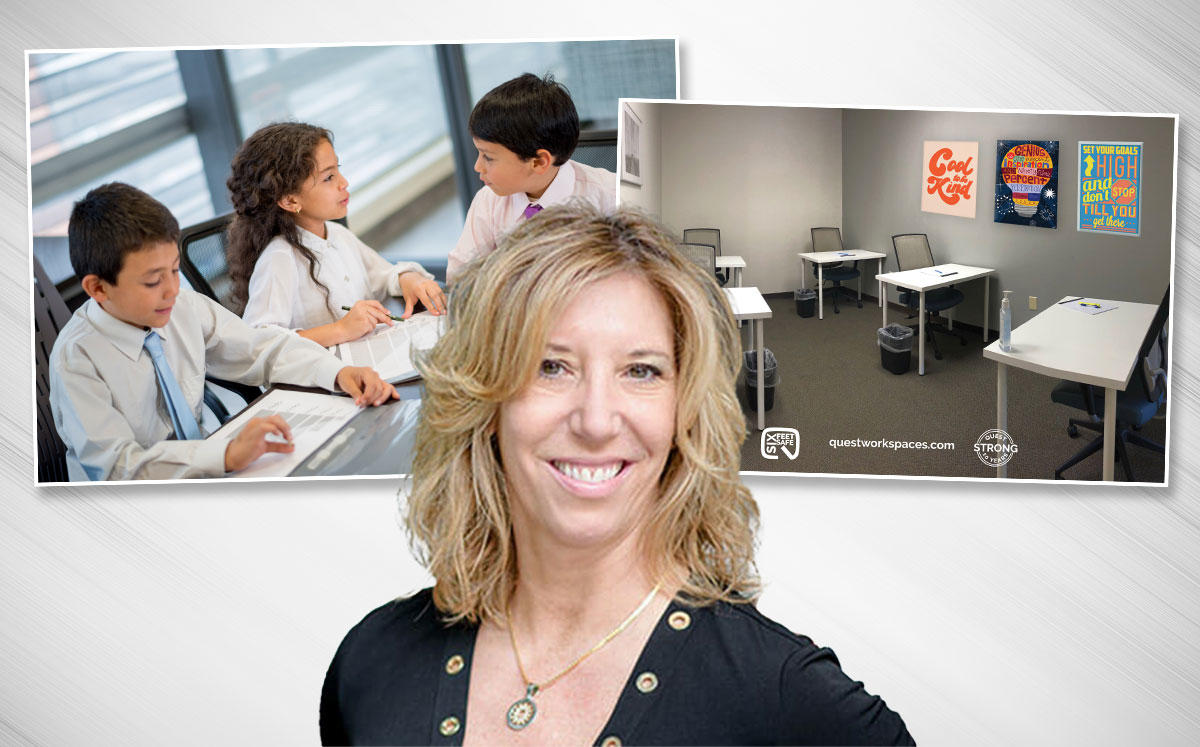Office is out, but school is in session.
Quest Workspaces, a co-working operator with 12 locations in Florida and New York, is turning some of its enclosed office space into small pods where groups of students can gather for virtual learning.
The move comes as many school districts are opting to forgo in-person teaching for the start of the new school year, due to Covid-19. At the same time, it’s a means for co-working, which has been hit hard by the pandemic, to cope with declining demand for office space.
In New York, co-working leasing was down 84 percent in the first quarter, year-over-year, according to commercial brokerage JLL.
Co-working operators like Quest, Industrious and WeWork are looking for ways to fill that space.
For Quest, the pods will function essentially as small classrooms. Students will be dropped off in the morning to go to their pods, to be accompanied by a tutor, teacher, parent or supervisor.
“It’s no different than what we do in terms of managing our space. We can bring companies together of all different sizes,” said Laura Kozelouzek, CEO of Quest Workspaces. “There is a need for people to get out of their homes.”
The Quest Micro-Class Pods start at $200 per child per month, for children of Quest members. For nonmembers, the pods start at $400 per child per month. The pods can include up to six students per pod, and are primarily geared toward high school or middle school students, Kozelouzek said. In South Florida, Quest has two locations on Brickell Avenue and in Coral Gables, and one each in Doral, Fort Lauderdale, Plantation, Boca Raton and West Palm Beach. Quest also has two offices in New York City.
Suzanne West, a longtime user of Quest’s New York and Miami locations, is considering leasing a pod for her stepdaughter, who is an incoming freshman at Miami Beach Senior High. “I am very comfortable having my daughter there,” West said. “We can have supervision. They can even be on other schedules.”
New York-based Industrious is also considering the move. “This is something we are exploring internally to determine whether or not it can be done safely and responsibly,” said a spokesperson for the company.
WeWork’s CEO Sandeep Mathrani has also said previously that the company is considering using its space for classrooms.
In Chicago, Optima Signature, a 56-story, 490-unit apartment tower in the Streeterville neighborhood, is converting four of its 25 office suites into classrooms, the Chicago Tribune reported. Interest is expected to come from families whose children attend the Montessori school in the tower, according to the report.
The new business line could help an office sector that was ailing even prior to the pandemic.
Leasing activity for co-working, also known as flexible space, dropped 50 percent globally in the fourth quarter of 2019 compared to the previous year, according to JLL.
Lending to buildings in which co-working is a tenant is also difficult, according to David Eyzenberg of Eyzenberg & Company, who arranges financing for commercial real estate projects.
“It was hard to finance office properties where co-working took up a significant percentage of space,” Eyzenberg said. “If it was a multi-tenant property, it was possible, but if it was a single co-working tenant space it was very difficult and expensive. Throughout the pandemic, it’s been more difficult.”
Many of the lagging leasing figures in co-working stem from embattled WeWork. Last year, the New York-based company pulled out of its initial public offering and saw its valuation drop from $47 billion to about $5 billion. WeWork recently hired JLL and CBRE to help fill millions of square feet now vacant in New York City and Los Angeles. The company closed its location on Miami Beach’s Lincoln Road and pulled out of a planned 115,000-square-foot lease at 149 Madison Avenue in Manhattan.
Yet, co-working’s woes could eventually be alleviated, according to JLL. The firm projects that in the future, companies will gravitate to co-working, or flexible office space, as fewer firms will want to commit to long-term leases. JLL projects that 30 percent of all office space will be consumed flexibly by 2030.
Still, challenges remain in the near term. “People are afraid to go into those types of environments,” said Colliers International Florida’s Keith Edelman, referring to some crowded co-working spaces. “We are going to start seeing those spaces downsizing.”
